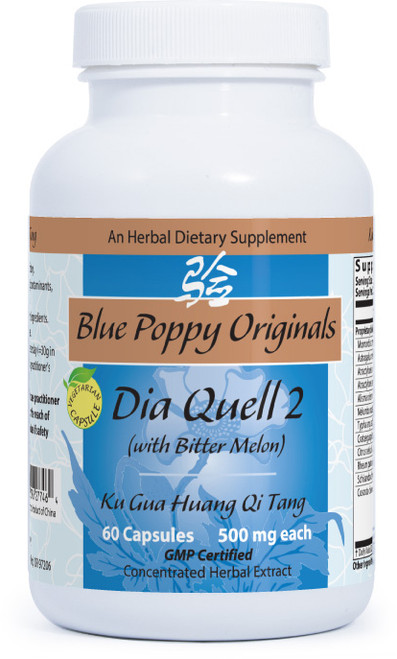
DiaQuell 2 with Bitter Melon (Momordica & Astragalus Combination) 60 capsules 10:1 extract
LOGIN REQUIRED
You must sign into an account before you can purchase these products.
Blue Poppy Originals
Unit Size: 60 (9:1 extract) caps
Dosage: Fast and effective support for patients with symptoms of high blood sugar and can work in as few as 7-10 days.
Potency: 10:1 (average) 500mg
Contraindications: Effulgent heat
Chinese Symptomology: Xiao Ke (wasting and thirsting)
Western Symptomology: Diabetes mellitus (early stage);Hypoglycemia
Actions: Supplements the qi and nourishes yin, quickens the blood and dispels stasis, cools the blood and clears heat.
Pattern: Qi and yin dual vacuity with slight but enduring heat and possible blood stasis.
Chinese name: Yi Qi Yang Yin Huo Xue Tang
English name: DiaQuell
Designed for patients with diabetes mellitus and used in a clinical trial at the Huai Hua Municipal People's Hospital. Based on this clinical trial, the doctors found that this formula was effective support for patients who have high blood sugar levels with few other symptoms, or they may have dry mouth, heart palpitations, shortness of breath, dizziness and tinnitus, blurred vision, low back and knee soreness and limpness, numbness of the extremities, as well as abnormalities in blood flow to the limbs.
This formula is for qi and yin dual vacuity complicated by blood stasis resulting in diabetes mellitus. Classical descriptions of thirsting and wasting all involve heat. However, these descriptions typically describe the later stages of diabetes mellitus, and, today, many people are diagnosed with diabetes without being symptomatic and without marked signs of heat. In fact, most contemporary Chinese sources agree that qi and yin dual vacuity is the most common early pattern of diabetes. Typically, this evolves from a liver-spleen disharmony based on the saying from the Nei Jing (Inner Classic), "[At] forty years, yin is automatically half." In other words, on top of a pre-existing spleen qi vacuity, there is now a yin vacuity as well. Although some patients develop diabetes early on in life, for most people, diabetes is a condition associated with aging. Therefore, in addition to qi and yin vacuity, blood stasis is a common complication. This is based on Yan De-xins assertion that essentially all chronic diseases associated with aging are complicated by at least an element of blood stasis. Blood stasis is definitely present in most of the complications of diabetes, such as neuropathy, nephropathy, retinopathy, and diabetic dermopathy. Thus the appropriateness of the principles of boosting the qi, nourishing yin, and quickening the blood.
Huang Qi; Yi Yang Shen; Sheng Di Huang; Shan Yao; Dan Shen; Ge Gen; Xuan Shen; Chi Shao; Mai Men Dong; Fu Ling